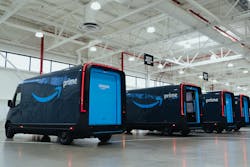Executives at Rivian Automotive said Nov. 7 they are raising the electric vehicle manufacturer’s production guidance for the second time this year. CEO RJ Scaringe and his team now expect to produce 54,000 vehicles in 2023, an increase from the target of 52,000 they set last quarter and the latest sign that Rivian is pulling away from the pack of EV startups.
The new production outlook was announced alongside Rivian’s results for the third quarter, when the California-based company produced 16,304 vehicles and delivered 15,564 to mark its strongest quarter to date. To make its 2023 goal, it will need to produce just over 14,300 vehicles in the current quarter.
Up next on Rivian’s growth path: A week of downtime at its Illinois plant later this month for what Scaringe called “validation builds” as teams prepare to incorporate engineering design changes to the R1 truck platform. Those changes will be officially implemented during planned downtime in the second quarter of 2024.
CFO Claire McDonough added that there will be some changes to production lines during next year’s downtime. Plant capacity will stay at 150,000 units, she said, but the R1’s share of that number will grow to 85,000 from 65,000 today. The remainder of the plant’s capacity will go to the EDV delivery van.
Rivian generated $1.3 billion in sales during the third quarter but still booked gross losses of $477 million, which was higher than in the second quarter. (The company ended the quarter with $9.1 billion in cash.) Still, Scaringe and McDonough have also brought down their full-year EBITDA loss estimate to $4 billion. The company last month raised a $1.75 billion via a green convertible note to help fund construction of its second plant in Georgia next year.
“By maintaining a strong balance sheet, we are well positioned as we look to start production of the R2 platform in 2026,” she said.
Alongside their earnings, executives also announced the end of their exclusivity deal with Amazon. The agreement, which was made in 2019, prevented Rivian from selling its EDV to other companies for four years from when the first deliveries were made. Rivian, which pledged to help Amazon put 100,000 EDVs on the road by 2030, has so far delivered 10,000 vehicles to the retail giant.
“This has been part of our plan with Rivian from the beginning,” said Udit Madan, vice president of transportation at Amazon. “We’ve always said that we want others to benefit from their technology in the long run because having more electric delivery vehicles on the road is good for our communities and our planet.”
More EDV sales—Scaringe said his team is talking to “a diverse set of new commercial customers”—will help not only Rivian, but Amazon, too: The retailer and tech services titan owns 17% of Rivian.
Shares of Rivian (Ticker: RIVN) fell about 2% to $17 on Nov. 8, the first day of regular trading after its leaders’ earnings report. Over the past six months, they are up more than 20%, pushing the company’s market capitalization to about $16 billion.
